Learning to count from 1 to 1000 in Greek isn’t just about language skills; it’s a way to connect with a culture full of history and innovation. Starting with simple numbers and moving to more complex ones teaches us about the logic and history that shaped Greece. As we look at how these numbers grow, we can see their role in modern Greek life and their links to ancient Greek contributions to math and science.
Greek Numbers
Let’s dive into Greek numbers, starting with the basics: the digits from 1 to 10. Each number is more than just a count; it has its own sound and feel. Moving up, from 11 to 100, things get a bit trickier. Greek uses combinations and some unique twists that really show off the language’s detailed nature. Lastly, when we look at numbers from 100 to 1000, it’s all about building bigger numbers using prefixes and suffixes. This system is key for everyday talking and math in Greek.
Greek Numbers from 1 to 10
Greek numbers from 1 to 10 are the basics you need to know for counting and everyday dealings. It starts with ‘ένα’ (éna) for 1 and ‘δύο’ (dío) for 2. These numbers are crucial for simple transactions. Next, we have ‘τρία’ (tría) for 3, ‘τέσσερα’ (tésera) for 4, and ‘πέντε’ (pénte) for 5. We then move on to ‘έξι’ (éxi) for 6, ‘επτά’ (eptá) for 7, ‘οκτώ’ (októ) for 8, and ‘εννέα’ (ennéa) for 9. Knowing these numbers helps a lot in daily conversations, whether you’re shopping, making plans, or just interacting with Greek speakers.
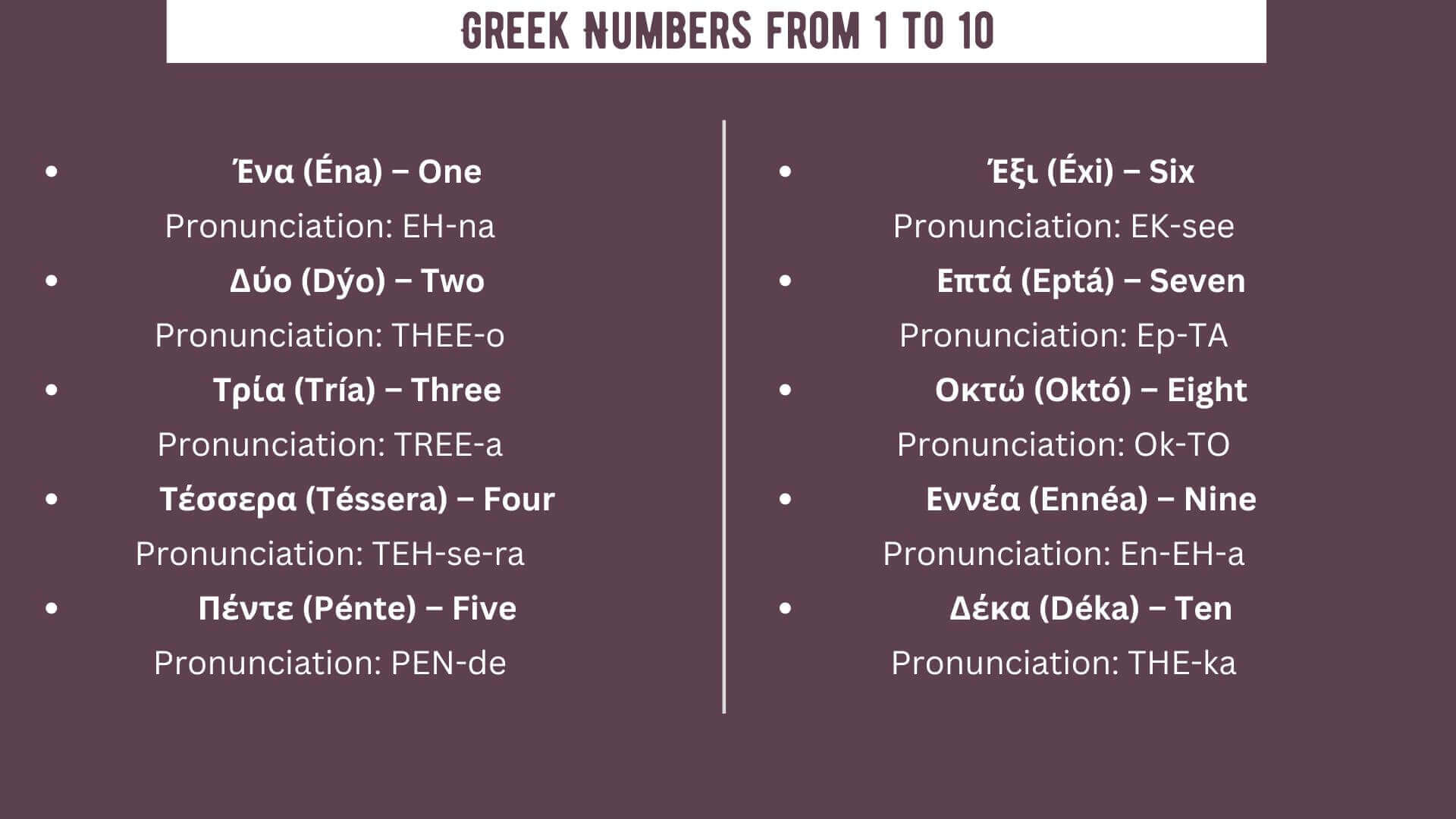
- Ένα (Éna) – One
Pronunciation: EH-na - Δύο (Dýo) – Two
Pronunciation: THEE-o - Τρία (Tría) – Three
Pronunciation: TREE-a - Τέσσερα (Téssera) – Four
Pronunciation: TEH-se-ra - Πέντε (Pénte) – Five
Pronunciation: PEN-de - Έξι (Éxi) – Six
Pronunciation: EK-see - Επτά (Eptá) – Seven
Pronunciation: Ep-TA - Οκτώ (Októ) – Eight
Pronunciation: Ok-TO - Εννέα (Ennéa) – Nine
Pronunciation: En-EH-a - Δέκα (Déka) – Ten
Pronunciation: THE-ka
Greek Numbers from 11 to 100
Learning Greek numbers from 11 to 100 helps with everyday communication in Greek. It starts with the unique names for 11 and 12: ‘έντεκα’ (éndeka) and ‘δώδεκα’ (dódeka). For numbers 13 through 19, you add ‘δέκα’ (déka), which means ten, to the unit digit. For example, ‘δεκατρία’ (dekatria) is thirteen, and ‘δεκαντέσσερα’ (dekatésera) is fourteen. The multiples of ten from 20 up, like ‘είκοσι’ (íkosi) for 20 and ‘τριάντα’ (triánta) for 30, follow a pattern too, going all the way up to 100. This way of forming numbers shows both creativity and regularity in Greek.
11–19
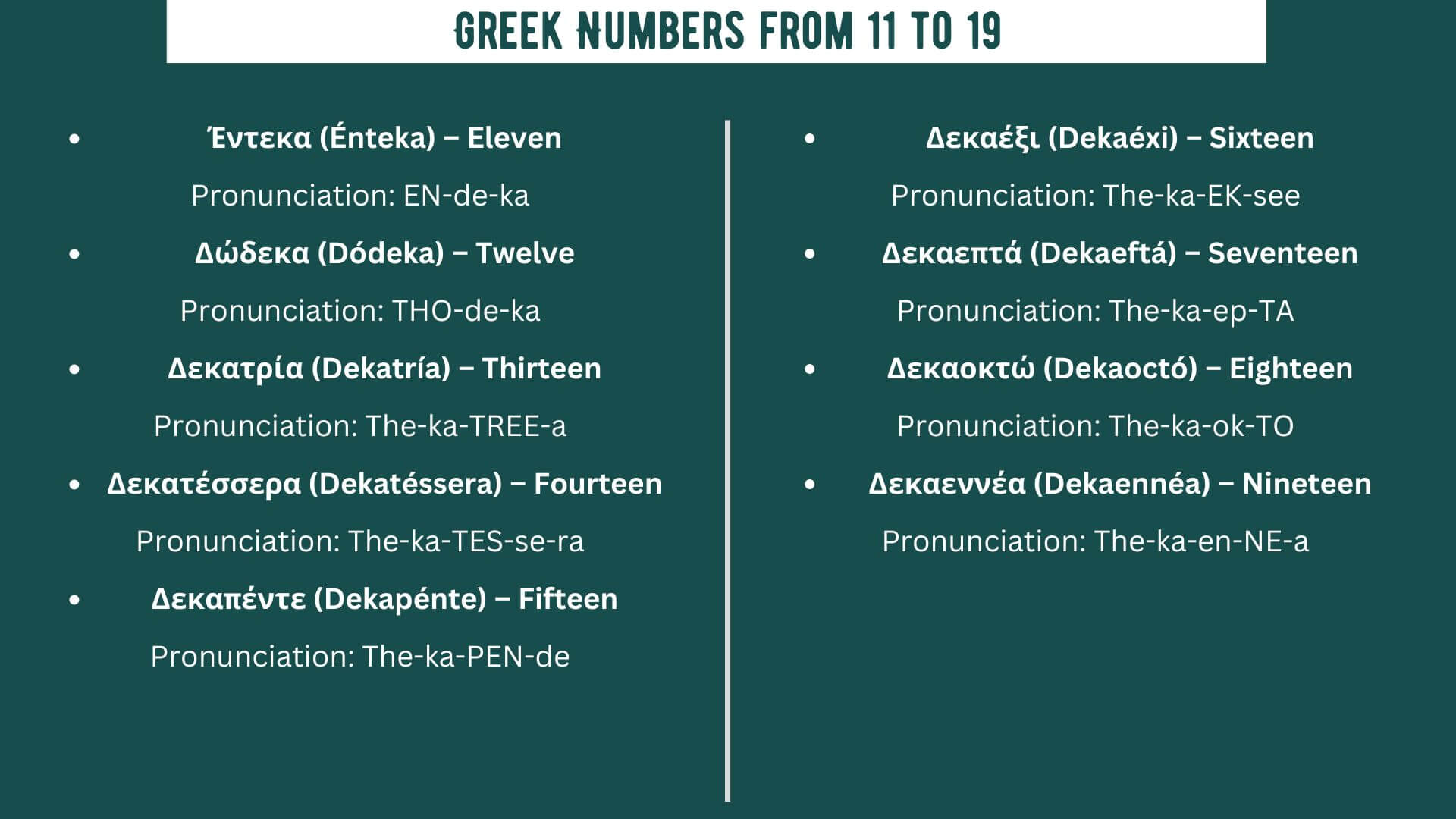
- Έντεκα (Énteka) – Eleven
Pronunciation: EN-de-ka - Δώδεκα (Dódeka) – Twelve
Pronunciation: THO-de-ka - Δεκατρία (Dekatría) – Thirteen
Pronunciation: The-ka-TREE-a - Δεκατέσσερα (Dekatéssera) – Fourteen
Pronunciation: The-ka-TES-se-ra - Δεκαπέντε (Dekapénte) – Fifteen
Pronunciation: The-ka-PEN-de - Δεκαέξι (Dekaéxi) – Sixteen
Pronunciation: The-ka-EK-see - Δεκαεπτά (Dekaeftá) – Seventeen
Pronunciation: The-ka-ep-TA - Δεκαοκτώ (Dekaoctó) – Eighteen
Pronunciation: The-ka-ok-TO - Δεκαεννέα (Dekaennéa) – Nineteen
Pronunciation: The-ka-en-NE-a
20–29
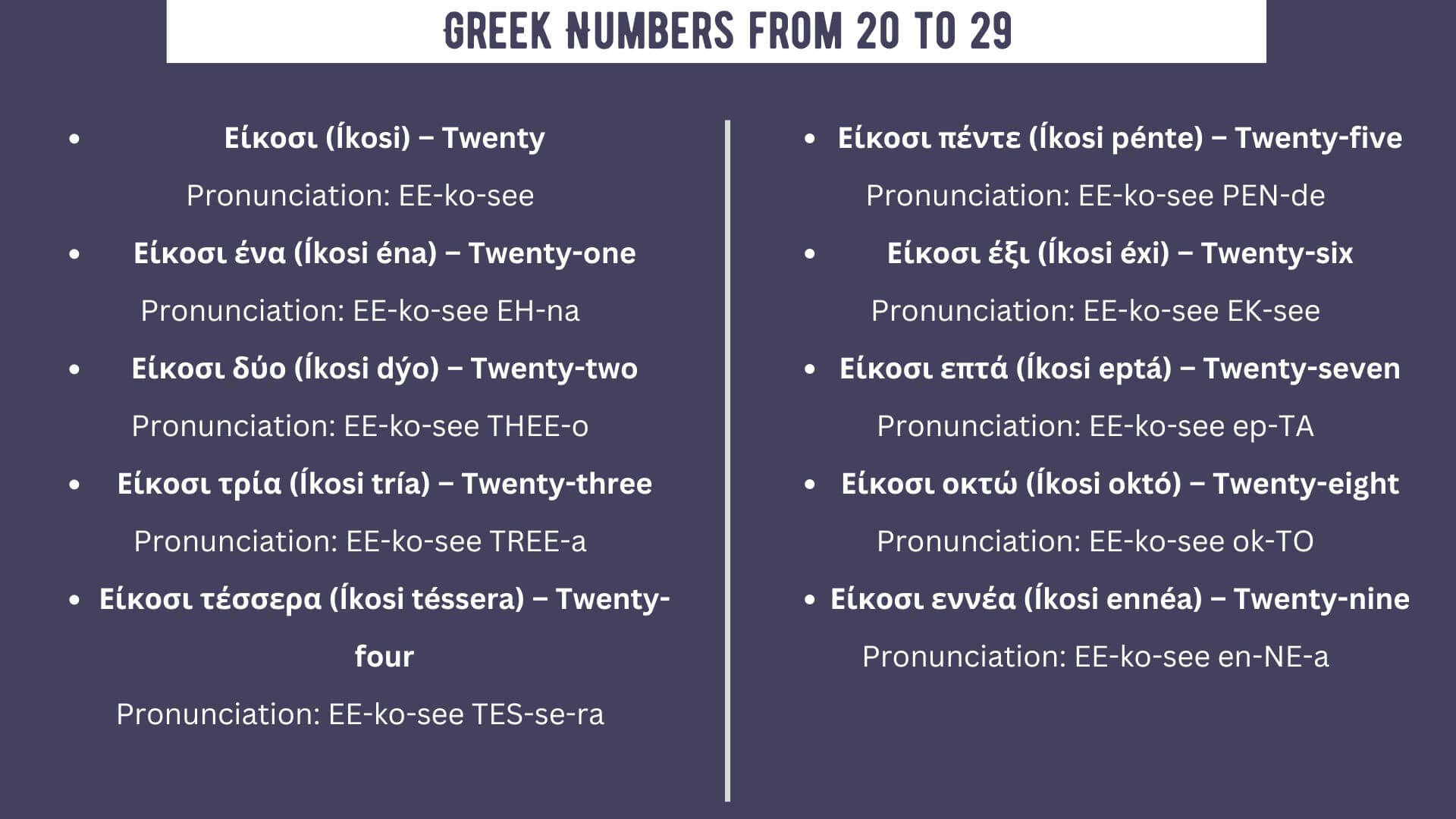
- Είκοσι (Íkosi) – Twenty
Pronunciation: EE-ko-see - Είκοσι ένα (Íkosi éna) – Twenty-one
Pronunciation: EE-ko-see EH-na - Είκοσι δύο (Íkosi dýo) – Twenty-two
Pronunciation: EE-ko-see THEE-o - Είκοσι τρία (Íkosi tría) – Twenty-three
Pronunciation: EE-ko-see TREE-a - Είκοσι τέσσερα (Íkosi téssera) – Twenty-four
Pronunciation: EE-ko-see TES-se-ra - Είκοσι πέντε (Íkosi pénte) – Twenty-five
Pronunciation: EE-ko-see PEN-de - Είκοσι έξι (Íkosi éxi) – Twenty-six
Pronunciation: EE-ko-see EK-see - Είκοσι επτά (Íkosi eptá) – Twenty-seven
Pronunciation: EE-ko-see ep-TA - Είκοσι οκτώ (Íkosi októ) – Twenty-eight
Pronunciation: EE-ko-see ok-TO - Είκοσι εννέα (Íkosi ennéa) – Twenty-nine
Pronunciation: EE-ko-see en-NE-a
30–39
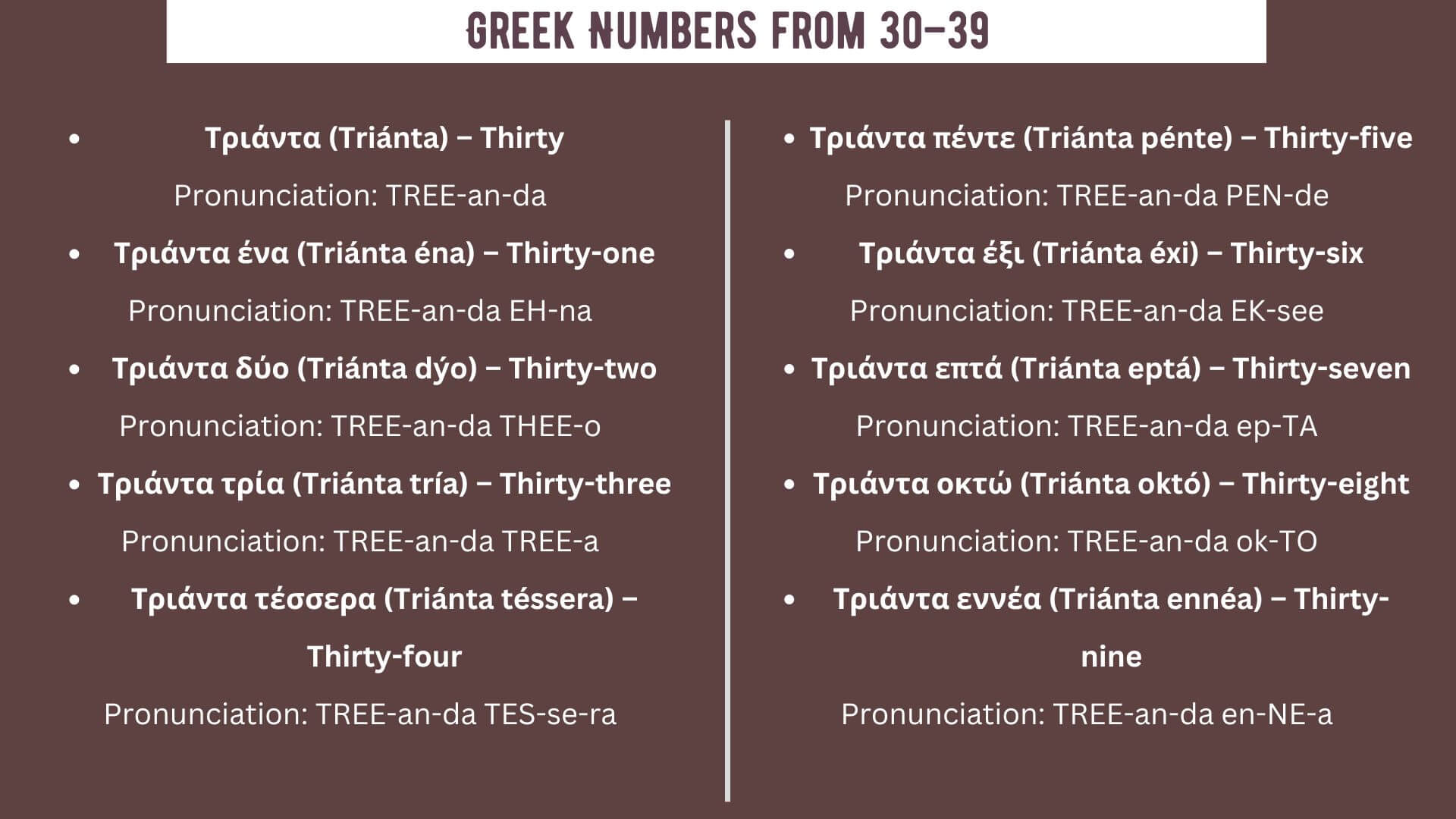
- Τριάντα (Triánta) – Thirty
Pronunciation: TREE-an-da - Τριάντα ένα (Triánta éna) – Thirty-one
Pronunciation: TREE-an-da EH-na - Τριάντα δύο (Triánta dýo) – Thirty-two
Pronunciation: TREE-an-da THEE-o - Τριάντα τρία (Triánta tría) – Thirty-three
Pronunciation: TREE-an-da TREE-a - Τριάντα τέσσερα (Triánta téssera) – Thirty-four
Pronunciation: TREE-an-da TES-se-ra - Τριάντα πέντε (Triánta pénte) – Thirty-five
Pronunciation: TREE-an-da PEN-de - Τριάντα έξι (Triánta éxi) – Thirty-six
Pronunciation: TREE-an-da EK-see - Τριάντα επτά (Triánta eptá) – Thirty-seven
Pronunciation: TREE-an-da ep-TA - Τριάντα οκτώ (Triánta októ) – Thirty-eight
Pronunciation: TREE-an-da ok-TO - Τριάντα εννέα (Triánta ennéa) – Thirty-nine
Pronunciation: TREE-an-da en-NE-a
40–49
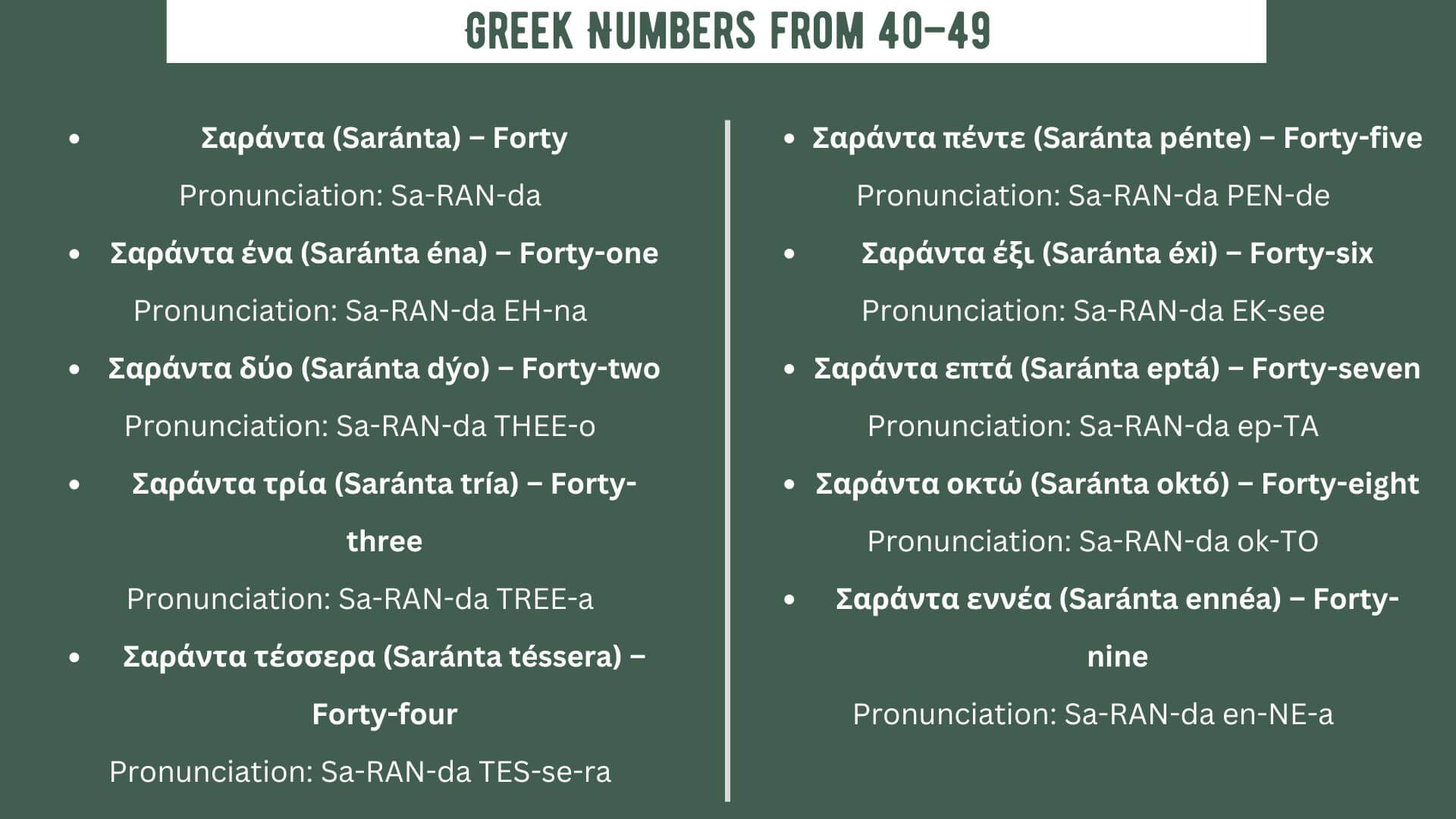
- Σαράντα (Saránta) – Forty
Pronunciation: Sa-RAN-da - Σαράντα ένα (Saránta éna) – Forty-one
Pronunciation: Sa-RAN-da EH-na - Σαράντα δύο (Saránta dýo) – Forty-two
Pronunciation: Sa-RAN-da THEE-o - Σαράντα τρία (Saránta tría) – Forty-three
Pronunciation: Sa-RAN-da TREE-a - Σαράντα τέσσερα (Saránta téssera) – Forty-four
Pronunciation: Sa-RAN-da TES-se-ra - Σαράντα πέντε (Saránta pénte) – Forty-five
Pronunciation: Sa-RAN-da PEN-de - Σαράντα έξι (Saránta éxi) – Forty-six
Pronunciation: Sa-RAN-da EK-see - Σαράντα επτά (Saránta eptá) – Forty-seven
Pronunciation: Sa-RAN-da ep-TA - Σαράντα οκτώ (Saránta októ) – Forty-eight
Pronunciation: Sa-RAN-da ok-TO - Σαράντα εννέα (Saránta ennéa) – Forty-nine
Pronunciation: Sa-RAN-da en-NE-a
50–59
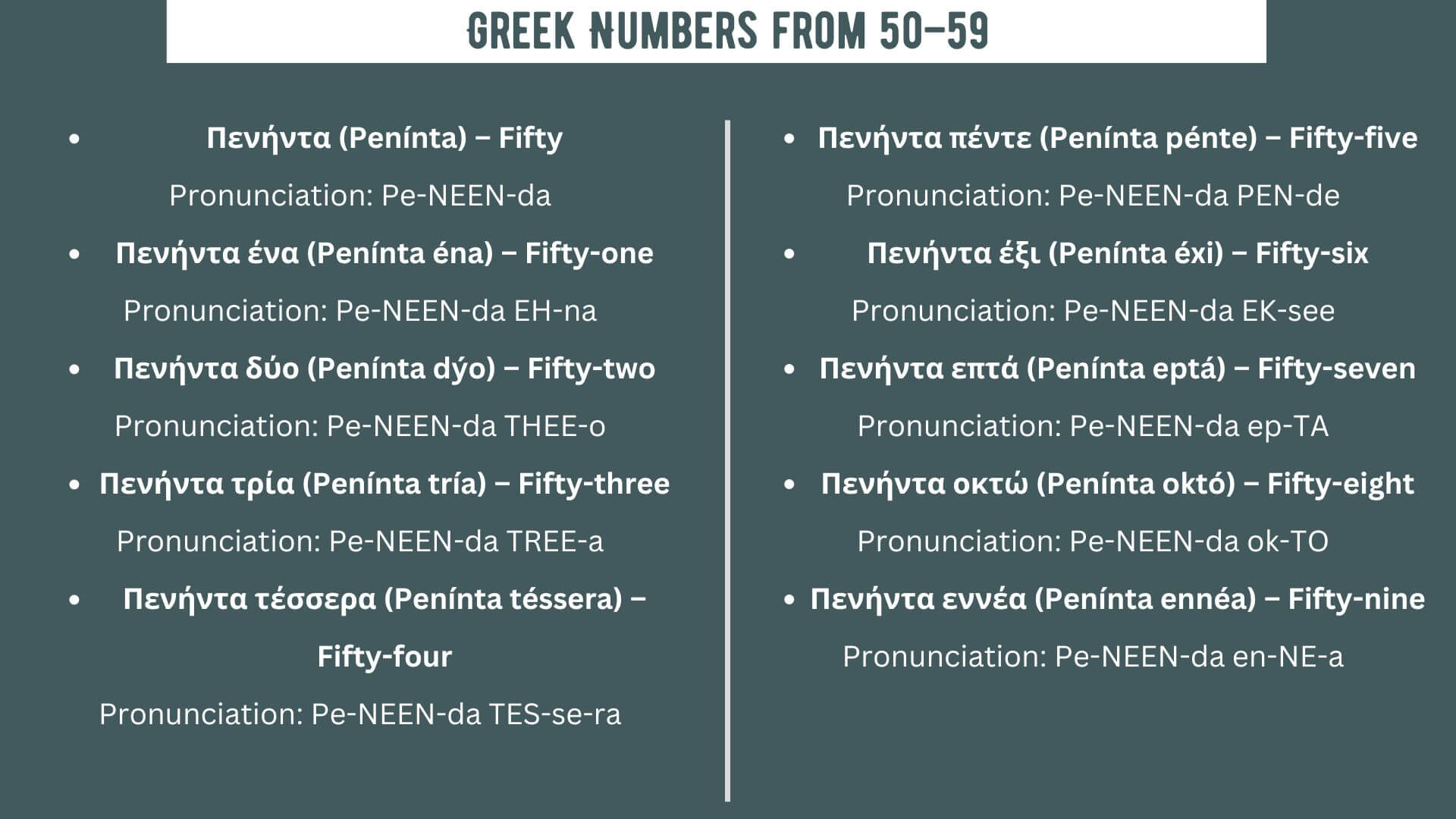
- Πενήντα (Penínta) – Fifty
Pronunciation: Pe-NEEN-da - Πενήντα ένα (Penínta éna) – Fifty-one
Pronunciation: Pe-NEEN-da EH-na - Πενήντα δύο (Penínta dýo) – Fifty-two
Pronunciation: Pe-NEEN-da THEE-o - Πενήντα τρία (Penínta tría) – Fifty-three
Pronunciation: Pe-NEEN-da TREE-a - Πενήντα τέσσερα (Penínta téssera) – Fifty-four
Pronunciation: Pe-NEEN-da TES-se-ra - Πενήντα πέντε (Penínta pénte) – Fifty-five
Pronunciation: Pe-NEEN-da PEN-de - Πενήντα έξι (Penínta éxi) – Fifty-six
Pronunciation: Pe-NEEN-da EK-see - Πενήντα επτά (Penínta eptá) – Fifty-seven
Pronunciation: Pe-NEEN-da ep-TA - Πενήντα οκτώ (Penínta októ) – Fifty-eight
Pronunciation: Pe-NEEN-da ok-TO - Πενήντα εννέα (Penínta ennéa) – Fifty-nine
Pronunciation: Pe-NEEN-da en-NE-a
60–69
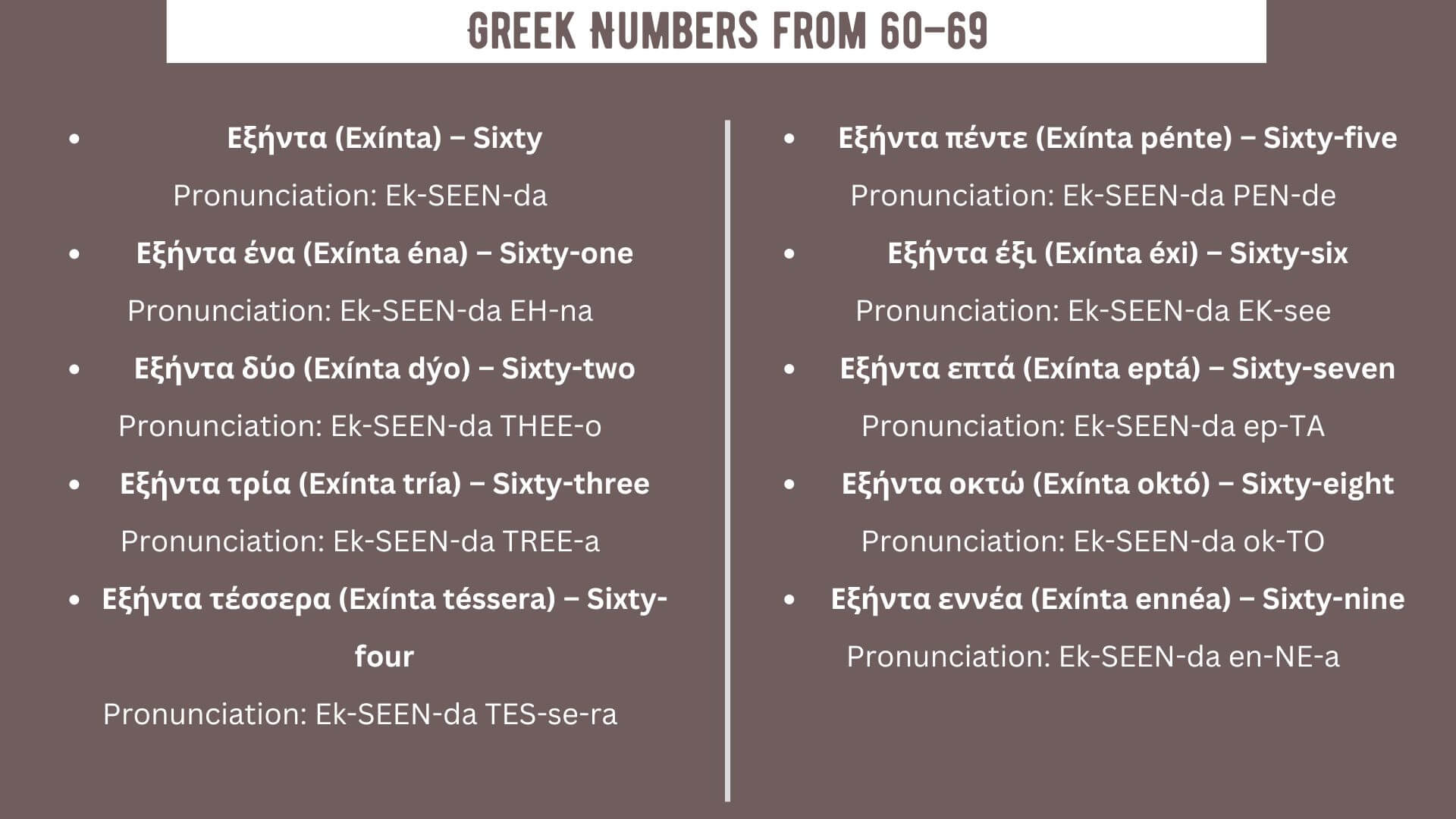
- Εξήντα (Exínta) – Sixty
Pronunciation: Ek-SEEN-da - Εξήντα ένα (Exínta éna) – Sixty-one
Pronunciation: Ek-SEEN-da EH-na - Εξήντα δύο (Exínta dýo) – Sixty-two
Pronunciation: Ek-SEEN-da THEE-o - Εξήντα τρία (Exínta tría) – Sixty-three
Pronunciation: Ek-SEEN-da TREE-a - Εξήντα τέσσερα (Exínta téssera) – Sixty-four
Pronunciation: Ek-SEEN-da TES-se-ra - Εξήντα πέντε (Exínta pénte) – Sixty-five
Pronunciation: Ek-SEEN-da PEN-de - Εξήντα έξι (Exínta éxi) – Sixty-six
Pronunciation: Ek-SEEN-da EK-see - Εξήντα επτά (Exínta eptá) – Sixty-seven
Pronunciation: Ek-SEEN-da ep-TA - Εξήντα οκτώ (Exínta októ) – Sixty-eight
Pronunciation: Ek-SEEN-da ok-TO - Εξήντα εννέα (Exínta ennéa) – Sixty-nine
Pronunciation: Ek-SEEN-da en-NE-a
70–79
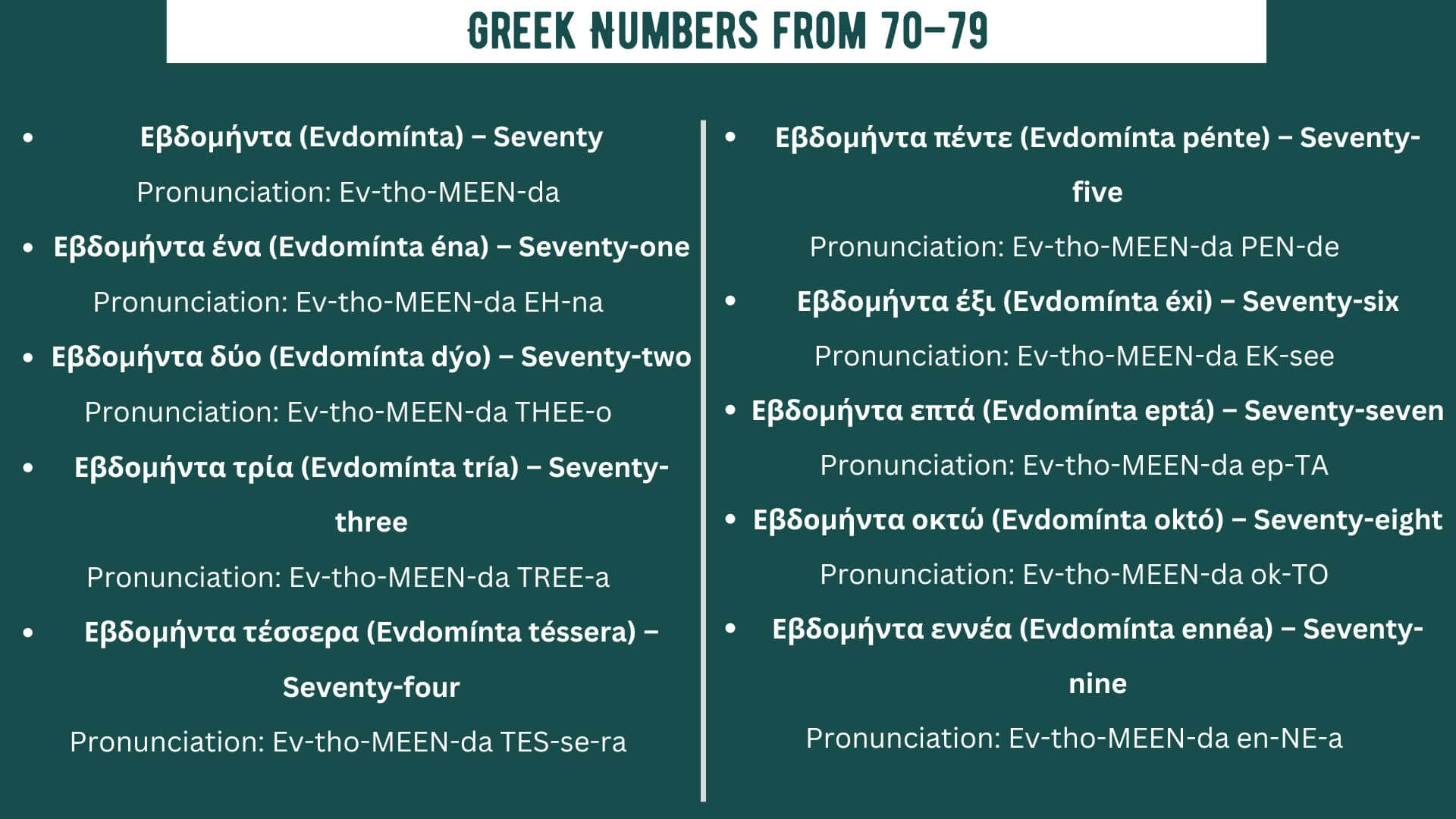
- Εβδομήντα (Evdomínta) – Seventy
Pronunciation: Ev-tho-MEEN-da - Εβδομήντα ένα (Evdomínta éna) – Seventy-one
Pronunciation: Ev-tho-MEEN-da EH-na - Εβδομήντα δύο (Evdomínta dýo) – Seventy-two
Pronunciation: Ev-tho-MEEN-da THEE-o - Εβδομήντα τρία (Evdomínta tría) – Seventy-three
Pronunciation: Ev-tho-MEEN-da TREE-a - Εβδομήντα τέσσερα (Evdomínta téssera) – Seventy-four
Pronunciation: Ev-tho-MEEN-da TES-se-ra - Εβδομήντα πέντε (Evdomínta pénte) – Seventy-five
Pronunciation: Ev-tho-MEEN-da PEN-de - Εβδομήντα έξι (Evdomínta éxi) – Seventy-six
Pronunciation: Ev-tho-MEEN-da EK-see - Εβδομήντα επτά (Evdomínta eptá) – Seventy-seven
Pronunciation: Ev-tho-MEEN-da ep-TA - Εβδομήντα οκτώ (Evdomínta októ) – Seventy-eight
Pronunciation: Ev-tho-MEEN-da ok-TO - Εβδομήντα εννέα (Evdomínta ennéa) – Seventy-nine
Pronunciation: Ev-tho-MEEN-da en-NE-a
80–89
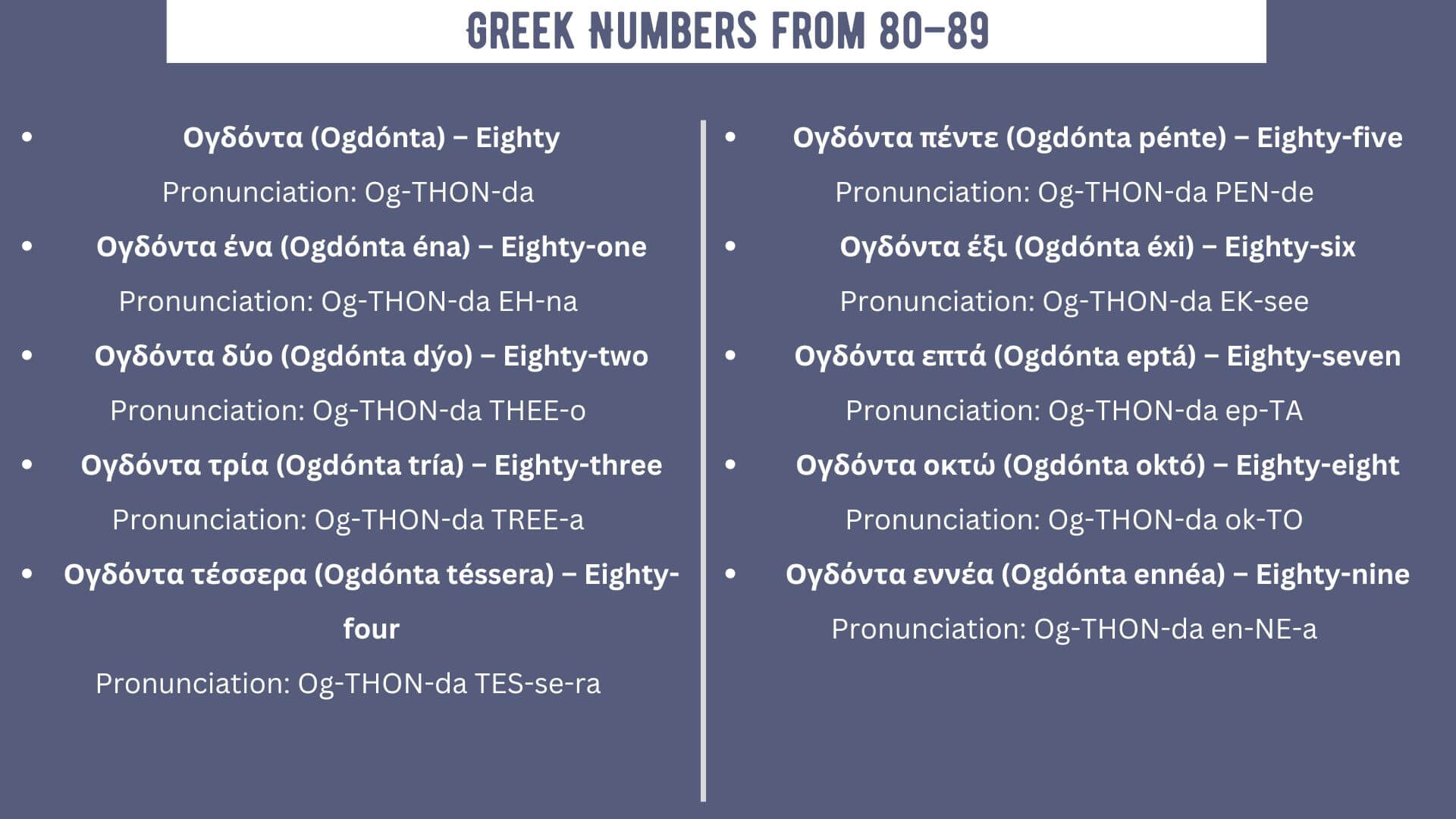
- Ογδόντα (Ogdónta) – Eighty
Pronunciation: Og-THON-da - Ογδόντα ένα (Ogdónta éna) – Eighty-one
Pronunciation: Og-THON-da EH-na - Ογδόντα δύο (Ogdónta dýo) – Eighty-two
Pronunciation: Og-THON-da THEE-o - Ογδόντα τρία (Ogdónta tría) – Eighty-three
Pronunciation: Og-THON-da TREE-a - Ογδόντα τέσσερα (Ogdónta téssera) – Eighty-four
Pronunciation: Og-THON-da TES-se-ra - Ογδόντα πέντε (Ogdónta pénte) – Eighty-five
Pronunciation: Og-THON-da PEN-de - Ογδόντα έξι (Ogdónta éxi) – Eighty-six
Pronunciation: Og-THON-da EK-see - Ογδόντα επτά (Ogdónta eptá) – Eighty-seven
Pronunciation: Og-THON-da ep-TA - Ογδόντα οκτώ (Ogdónta októ) – Eighty-eight
Pronunciation: Og-THON-da ok-TO - Ογδόντα εννέα (Ogdónta ennéa) – Eighty-nine
Pronunciation: Og-THON-da en-NE-a
90–99
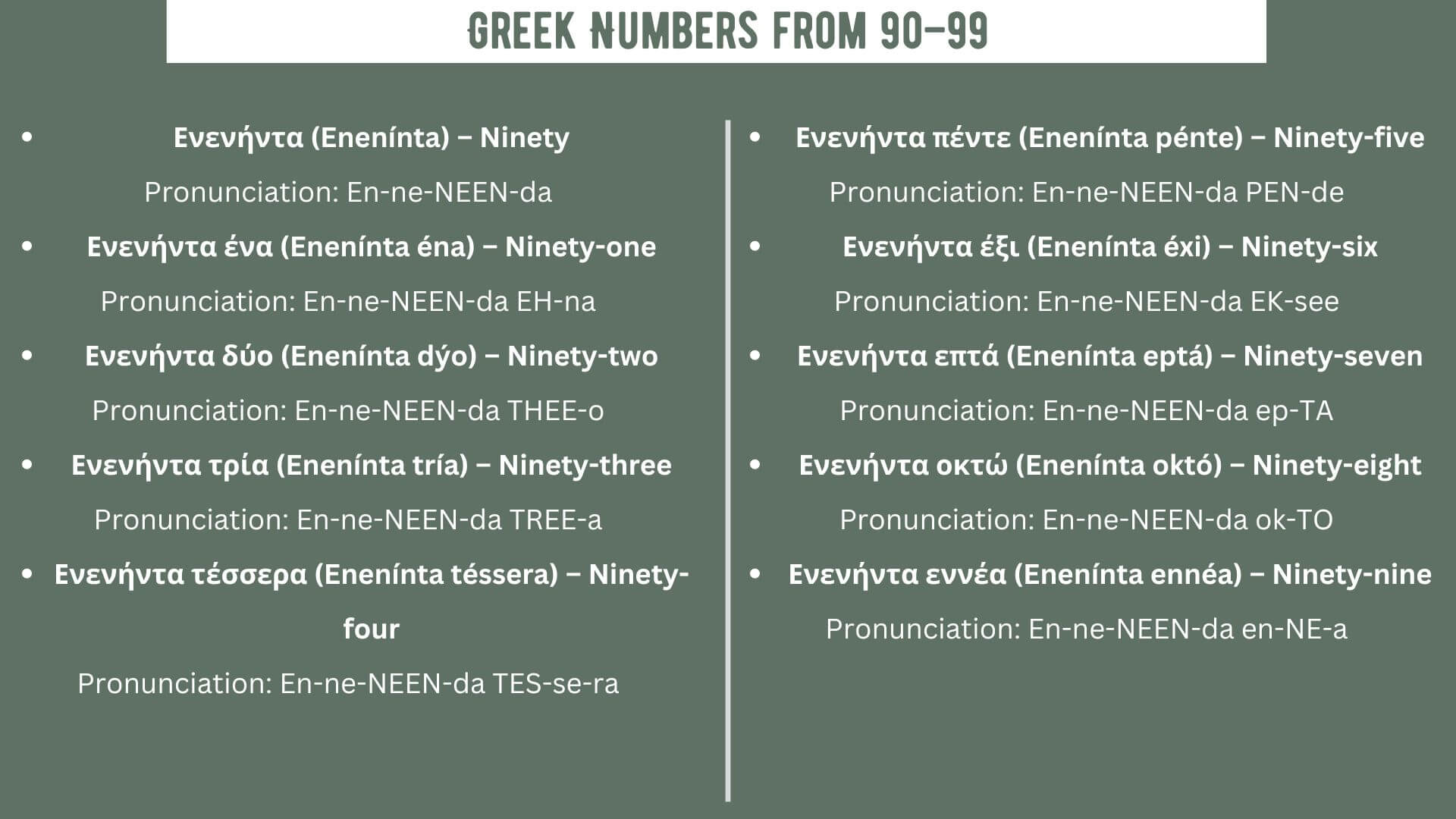
- Ενενήντα (Enenínta) – Ninety
Pronunciation: En-ne-NEEN-da - Ενενήντα ένα (Enenínta éna) – Ninety-one
Pronunciation: En-ne-NEEN-da EH-na - Ενενήντα δύο (Enenínta dýo) – Ninety-two
Pronunciation: En-ne-NEEN-da THEE-o - Ενενήντα τρία (Enenínta tría) – Ninety-three
Pronunciation: En-ne-NEEN-da TREE-a - Ενενήντα τέσσερα (Enenínta téssera) – Ninety-four
Pronunciation: En-ne-NEEN-da TES-se-ra - Ενενήντα πέντε (Enenínta pénte) – Ninety-five
Pronunciation: En-ne-NEEN-da PEN-de - Ενενήντα έξι (Enenínta éxi) – Ninety-six
Pronunciation: En-ne-NEEN-da EK-see - Ενενήντα επτά (Enenínta eptá) – Ninety-seven
Pronunciation: En-ne-NEEN-da ep-TA - Ενενήντα οκτώ (Enenínta októ) – Ninety-eight
Pronunciation: En-ne-NEEN-da ok-TO - Ενενήντα εννέα (Enenínta ennéa) – Ninety-nine
Pronunciation: En-ne-NEEN-da en-NE-a
100
- Εκατό (Ekató) – One hundred
Pronunciation: E-ka-TO
Greek Numbers Beyond 100
In Greek, the number 100 is written as εκατό (ekato). When expressing numbers between 101 and 199, the form changes slightly, becoming εκατόν (ekaton). After εκατόν, the numbers continue to follow a consistent pattern. For instance, the number 118 is εκατόν δεκαοκτώ (ekaton dekaokto), which combines εκατόν with δεκαοκτώ (meaning eighteen).
Here are a few more examples for clarity:
- 110 – Εκατόν δέκα (ekaton deka): “one hundred and ten”
- 143 – Εκατόν σαράντα τρία (ekaton saranta tria): “one hundred and forty-three”
- 168 – Εκατόν εξήντα οκτώ (ekaton exinta okto): “one hundred and sixty-eight”
- 176 – Εκατόν εβδομήντα έξι (ekaton evdominta exi): “one hundred and seventy-six”
- 193 – Εκατόν ενενήντα τρία (ekaton eneninta tria): “one hundred and ninety-three”
Numbers 200 and Beyond
Starting at 200, the word for “hundred” changes, and it’s important to pay attention to the different forms. For instance, the number 200 is διακόσια (diakosia), and not δύο (the word for two). The suffixes for hundreds follow a consistent pattern:
- 200 – διακόσια (diakosia): “two hundred”
- 300 – τριακόσια (triakosia): “three hundred”
- 400 – τετρακόσια (tetrakosia): “four hundred”
- 500 – πεντακόσια (pentakosia): “five hundred”
- 600 – εξακόσια (eksakosia): “six hundred”
- 700 – εφτακόσια (eftakosia): “seven hundred”
- 800 – οχτακόσια (oktakosia): “eight hundred”
- 900 – εννιακόσια (enniakosia): “nine hundred”
- 1000 – χίλια (hilia): “one thousand”
These patterns will help you navigate Greek numbers easily, whether you’re counting into the hundreds or beyond.
Also Read: How To Say “Dog” In Other Languages: A Simple Guide
Ordinal Numbers in Greek
Ordinal numbers in Greek, just like in English, are used to indicate the order of something in a list or sequence (first, second, third, etc.). Here’s how to form ordinal numbers in Greek, from first to tenth, with examples of higher numbers as well:
- First – πρώτος (prótos) for masculine, πρώτη (próti) for feminine, and πρώτο (próto) for neuter.
- Example: Ο πρώτος μαθητής (O prótos mathitís): “The first student”
- Second – δεύτερος (défteros) for masculine, δεύτερη (défteri) for feminine, and δεύτερο (déftero) for neuter.
- Example: Η δεύτερη θέση (I défteri thési): “The second place”
- Third – τρίτος (trítos) for masculine, τρίτη (tríti) for feminine, and τρίτο (tríto) for neuter.
- Example: Το τρίτο βιβλίο (To tríto vivlío): “The third book”
- Fourth – τέταρτος (tétartos), τέταρτη (tétarti), τέταρτο (tétarto)
- Example: Ο τέταρτος όροφος (O tétartos órofos): “The fourth floor”
- Fifth – πέμπτος (pémptos), πέμπτη (pémpti), πέμπτο (pémpto)
- Example: Η πέμπτη ημέρα (I pémpti iméra): “The fifth day”
- Sixth – έκτος (éktos), έκτη (ékti), έκτο (ékto)
- Example: Το έκτο μάθημα (To ékto máthima): “The sixth lesson”
- Seventh – έβδομος (évdomos), έβδομη (évdomi), έβδομο (évdomo)
- Example: Ο έβδομος αγώνας (O évdomos agónas): “The seventh race”
- Eighth – όγδοος (ógdoos), όγδοη (ógdoi), όγδοο (ógdoo)
- Example: Η όγδοη πόλη (I ógdoi póli): “The eighth city”
- Ninth – ένατος (énatos), ένατη (énati), ένατο (énato)
- Example: Το ένατο κεφάλαιο (To énato kefálaio): “The ninth chapter”
- Tenth – δέκατος (dékatos), δέκατη (dékatí), δέκατο (dékato)
- Example: Η δέκατη φορά (I dékatí forá): “The tenth time”
Higher Ordinal Numbers
Once you understand the pattern for basic ordinal numbers, forming higher ordinals is fairly straightforward. Ordinal numbers follow the general format of the cardinal number with a different ending. Here are a few examples:
- Eleventh – ενδέκατος (endékatos), ενδέκατη (endékati), ενδέκατο (endékato)
- Twentieth – εικοστός (ikostós), εικοστή (ikostí), εικοστό (ikostó)
- Hundredth – εκατοστός (ekatostós), εκατοστή (ekatostí), εκατοστό (ekatostó)
- Thousandth – χιλιοστός (hiliostós), χιλιοστή (hiliostí), χιλιοστό (hiliostó)
Patterns to Remember
- For numbers beyond ten, the endings change to match the gender (masculine, feminine, neuter) and follow a consistent pattern across all ordinals.
- For example, the number twenty-first would be εικοστός πρώτος (ikostós prótos) for masculine, εικοστή πρώτη (ikostí próti) for feminine, and εικοστό πρώτο (ikostó próto) for neuter.
By familiarizing yourself with these patterns, you can comfortably use ordinal numbers in Greek in any context.
Conclusion
To wrap it up, getting good at numbers in Greek is more than just about counting. It lets you get a real feel for the language and the culture. Start with the basics, like the cardinal numbers, and then move on to the more tricky ordinal ones. Knowing your numbers helps in everyday situations like talking about prices, sharing phone numbers, or counting things out. Keep practicing these numbers as you learn Greek. It’ll make your skills solid. Stick with it, and counting in Greek will soon feel natural. Keep visiting the Translation Blog for more translation articles like this.

